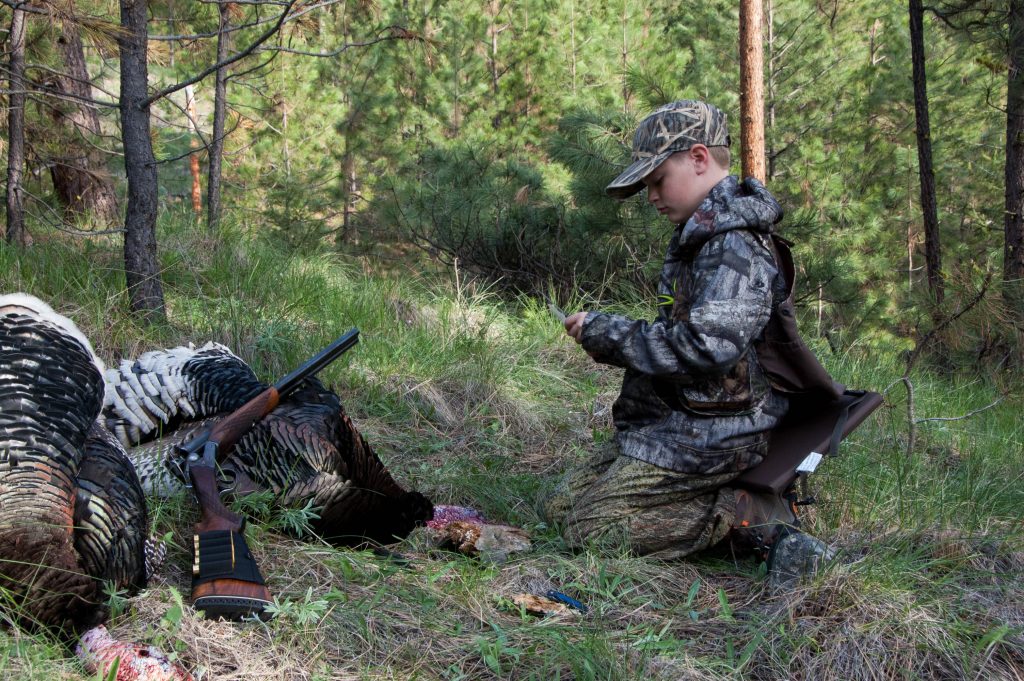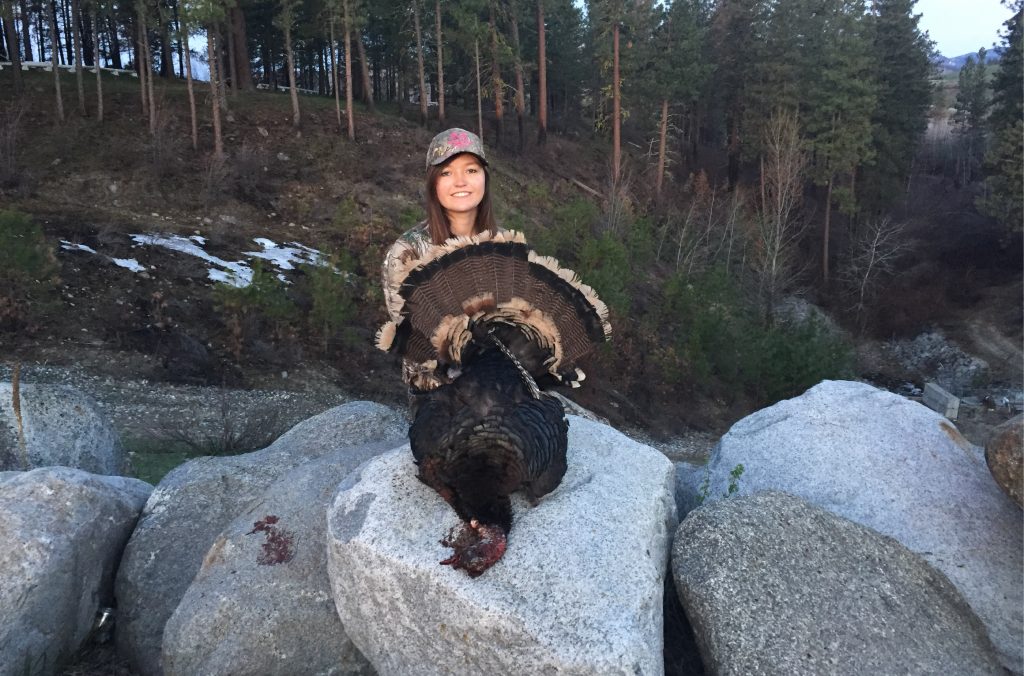


Youth turkey season: April 3-4, 2021
Speaking of new hunters, the youth turkey season in Washington opens up April 3-4. There is arguably no better time or way to introduce youth to hunting than a spring turkey hunt. Even if the youth has not taken a hunter education course, an experienced hunter can mentor a youth hunter via the WDFW hunter education deferral program, which has been very successful in jump-starting a new generation of hunters. In addition, any new hunter can contact the First Hunt Foundation and pursue hunting with one of their mentors this year.
New hunters have lots of questions. Mentors provide a leg up not only with rules and regulations but also with ethics. A good mentor will explain topics like public vs. private land hunting and hunting ethics, and demonstrate safety in the field. By role-modeling ethical behaviors in the field, new hunters gain practical knowledge that, over time, can improve public perceptions of hunting at large.
A couple common questions
Q: What should I do if another hunter/hunters are already at my chosen public land hunting spot?
A: Find another spot or move a respectable distance. If possible, you can discuss your plans with the other party and agree to spread out or go in opposite directions. You may have done your homework and figured out the area, but so did someone else. This is why it is a good reason to scout out at least two areas that are huntable by opening morning. Of course, the nuance may be that the public land you want to hunt covers a large area. If that’s the case, just do your best to create distance with the other hunter(s).
Q: What do I do if I’m turkey hunting and I see another hunter?
A: Make yourself known! Call out in a loud, clear voice if you see another hunter (especially if they are close to your “line of sight”). Be understanding that if you are on public land, they have the same right as you to be there.
The Washington Department of Fish and Wildlife’s Licensing Division would also like to remind potential hunters of a few requirements prior to spring turkey hunting:
- Hunter education is required for anyone born after Jan. 1, 1972.
- If a hunting license is purchased online or over the phone from WDFW, the license will be mailed. This may take up to 10 days and a hunter is not legal without the license and tag on their person while hunting. If a license is needed sooner than that, hunters must go to one of Washington’s license dealers. Follow this link to locate a WDFW license dealer near you.
- Hunters must have a WILD ID, which is a single person’s identification number in the WDFW licensing (WILD) system. Hunters can follow this link to create a profile, and a user must provide a username and password.
We hope this information is useful to new turkey hunters, and we thank you for following along on the Turkey Takeover. We’ll be back with more information as the openers get closer, so be sure to stay tuned for more turkey talk.
[/tatsu_text]By Kelly Riordan/WDFW
As I write this post, I’m reminded of the great Seattle baseball quote, “My oh my,” because for many Washington spring turkey hunters, days are flying off the calendar like a ball flying out of the park! We are days away from the first of two fantastic spring turkey seasons opening up.
Hunters have purchased their licenses and transport tags, researched places to hunt, and scouted out the best opening morning setup locations. What do they have with them? Let’s take a moment and review.
Here are the essentials a turkey hunter should have with them on the opener:
- A valid 2021-2022 small game hunting license (signed) with a turkey transport tag(s) on their person while hunting
- Proper camouflage clothing and footwear for a variety of spring weather conditions in the great Pacific Northwest
- A daypack with (recommended) first aid essentials, map and GPS receiver/online mapping tool, food, water, face covering, gloves, small knife, and you may want a gardening pad or something to sit on to keep your rear-end dry
- Legal weapon. Bowhunting is gaining in popularity but many turkey hunters prefer a shotgun. A 10-gauge or smaller shotgun that holds up to three shotshells is allowed. It is recommended that an average-sized adult use a 12-gauge and a youth or smaller person use a 20-gauge. Bring five shotshells with #4 shot or smaller (e.g., #6 shot). That’s three while hunting and two extras just in case.
- One or two turkey decoys. Either a single hen (female) or a hen and jake (immature tom) combination is best.
- Optional but recommended is a turkey call or variety of calls. Remember, there are dozens of calls to choose from. Some are easier than others to master so it comes down to personal preference. Learn the basic three hen calls: the yelp, the cluck, and the purr. You can also use owl hoots and crow or peacock calls to locate gobblers mid-day. The loud, sudden sound of these types of calls causes them to “shock gobble,” which can reveal a nearby tom’s location.
This list pretty well covers the basics a new hunter needs to get started and be successful with a spring turkey hunt. You can certainly employ pop-up style ground blinds and other gear as you gain experience and figure out what works best for you.



Youth turkey season: April 3-4, 2021
Speaking of new hunters, the youth turkey season in Washington opens up April 3-4. There is arguably no better time or way to introduce youth to hunting than a spring turkey hunt. Even if the youth has not taken a hunter education course, an experienced hunter can mentor a youth hunter via the WDFW hunter education deferral program, which has been very successful in jump-starting a new generation of hunters. In addition, any new hunter can contact the First Hunt Foundation and pursue hunting with one of their mentors this year.
New hunters have lots of questions. Mentors provide a leg up not only with rules and regulations but also with ethics. A good mentor will explain topics like public vs. private land hunting and hunting ethics, and demonstrate safety in the field. By role-modeling ethical behaviors in the field, new hunters gain practical knowledge that, over time, can improve public perceptions of hunting at large.
A couple common questions
Q: What should I do if another hunter/hunters are already at my chosen public land hunting spot?
A: Find another spot or move a respectable distance. If possible, you can discuss your plans with the other party and agree to spread out or go in opposite directions. You may have done your homework and figured out the area, but so did someone else. This is why it is a good reason to scout out at least two areas that are huntable by opening morning. Of course, the nuance may be that the public land you want to hunt covers a large area. If that’s the case, just do your best to create distance with the other hunter(s).
Q: What do I do if I’m turkey hunting and I see another hunter?
A: Make yourself known! Call out in a loud, clear voice if you see another hunter (especially if they are close to your “line of sight”). Be understanding that if you are on public land, they have the same right as you to be there.
The Washington Department of Fish and Wildlife’s Licensing Division would also like to remind potential hunters of a few requirements prior to spring turkey hunting:
- Hunter education is required for anyone born after Jan. 1, 1972.
- If a hunting license is purchased online or over the phone from WDFW, the license will be mailed. This may take up to 10 days and a hunter is not legal without the license and tag on their person while hunting. If a license is needed sooner than that, hunters must go to one of Washington’s license dealers. Follow this link to locate a WDFW license dealer near you.
- Hunters must have a WILD ID, which is a single person’s identification number in the WDFW licensing (WILD) system. Hunters can follow this link to create a profile, and a user must provide a username and password.
We hope this information is useful to new turkey hunters, and we thank you for following along on the Turkey Takeover. We’ll be back with more information as the openers get closer, so be sure to stay tuned for more turkey talk.




